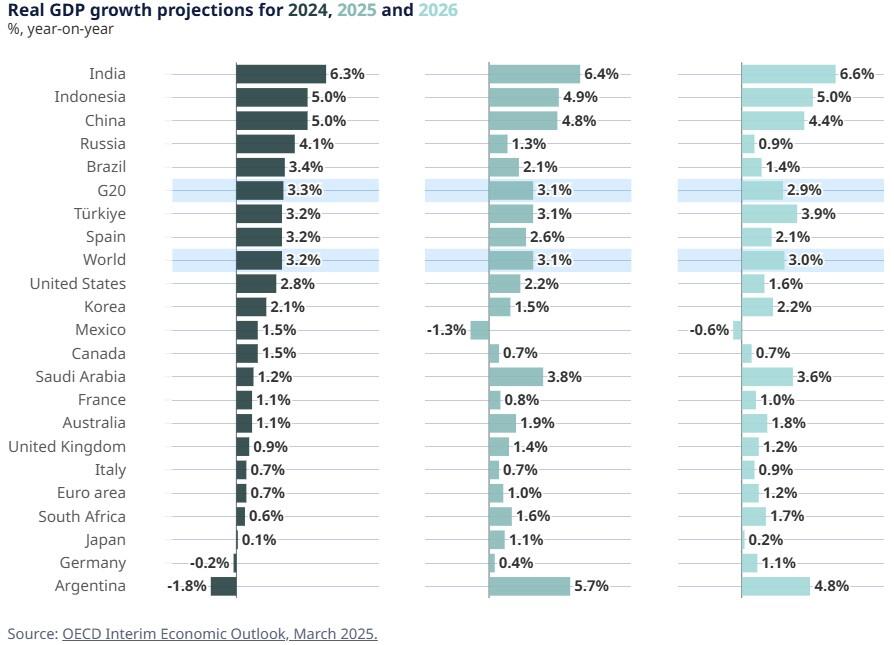A “softening of global prospects” - largely driven by United States President Donald Trump's tariff agenda - says the OECD, is the cause behind its decision to drop its global GDP growth forecast for next year by 0.2% since its last economic update three months ago.
The Organization for Economic Cooperation and Development's (OECD) ‘Steering through Uncertainty’ report says global GDP growth will moderate from 3.2% in 2024, 3.1% in 2025 and down to 3.0% in 2026 as higher trade barriers in several G20 economies and policy uncertainty weigh on investment and household spending.
The interim report update also flagged headline inflation falling from 3.8% this year down to 3.2% in 2026 across G20 economies.
If the OECD is right in its projections, underlying inflation is now projected to remain above central bank targets in many G20 countries next year. That's not good news for the Trump administration, which is banking on inflation easing.
Projections are based on the assumption that bilateral tariffs on the majority of merchandise between Canada and Mexico and the U.S. will be raised by 25% from 2 April.
Major economies' revised forecast
U.S. annual real GDP growth is projected to slow from its strong recent pace down to 2.2% this year and 1.6% in 2026.
Euro area real GDP growth is projected to be 1% in 2025 and 1.2% in 2026, as heightened uncertainty keeps growth subdued.
China is projected to slow from 4.8% this year to 4.4% in 2026.
United Kingdom GDP will slow to 1.4% growth this year, as opposed to the 1.7% previously anticipated and 0.1% lower than the 1.3% projected for next year.
Meanwhile, Australia's GDP growth forecast has been revised down by 0.7% for next year to just 1.8%.

The OECD says further fragmentation of the global economy is a key concern.
"Higher and broader increases in trade barriers would hit growth around the world and add to inflation; while higher-than-expected inflation would prompt more restrictive monetary policy and could give rise to disruptive repricing in financial markets," the world economic body wrote.
"On the upside, a more stable policy environment would reduce uncertainty, and agreements that lower tariffs from current levels and more ambitious structural policy reforms could strengthen growth," the OECD says.
Horizon of hope
The report says international cooperation is currently especially imperative to prevent a costly ratcheting up of trade barriers and could be excised in such ways as:
- A further lowering of policy interest rates in nations where underlying inflation is projected to moderate or remain subdued, provided inflation expectations remain well
anchored - Build on fiscal efforts to contain spending, enhance revenues and improve budgetary frameworks that would enable governments to react to future shocks and accommodate future spending pressures
- Reinvigorate domestic policy reforms to strengthen productivity against headwinds from trade pressures
“On the upside, any agreement that lowers tariffs from current levels or increased debt‑financed government spending on areas such as defence could result in stronger near‑term growth,” the report said.



